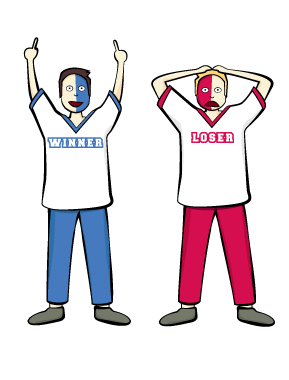Sports fans in league of their own
April 14, 2014
Spring is an exciting time for sports fans, with brackets to obsess over, the Stanley Cup to lust after and an NBA title at stake. But what is the difference between spectators and fanatics?
Psychologists have various theories about what drives sports fans to diehard status, but they tend to agree on one thing: Fandom has positive psychological benefits—until it goes too far.
Robert Fisher, psychologist and marketing professor at the University of Alberta in Canada, said people are genetically inclined to enjoy the competitive nature of sports. Fisher said he thinks sports fandom is like a modern form of tribalism that draws on the instinct to dominate an opposing group.
“We are evolutionarily wired to form these tribes and form these groups that tell us who we are, what kind of person we are,” Fisher said.
Self-identification is one of the most significant psychological benefits of being a sports fan, according to Ed Hirt, professor of Psychological and Brain Sciences at Indiana University-Bloomington. He said favoring a certain team becomes a part of how people define themselves, which makes it difficult for fans to support any team but their own for fear of dismantling their established identity.
Fisher said sports also function as a social outlet, allowing fans to form deeper connections with like-minded individuals and fulfill communicative needs.
People have an emotional need to feel included, Hirt said, adding that belonging to a community of like-minded fans alleviates feelings of loneliness.
However, Fisher cautioned that group dynamics in sports can lead to stereotyping and contentious rivalries, potentially negating the ability to achieve unity through sportsmanship—a concept psychologists refer to as the in-group, out-group social identity theory. This theory suggests that people distrust groups they do not belong to, according to Rick Grieve, clinical psychology professor at Western Kentucky University.
In 2006, Grieve and a colleague conducted a study to measure how fans view opposing teams and found that when the home team lost, fans were more likely to deem visiting fans unfriendly, rude and untrustworthy than when the home team won.
Fans sometimes take their negative attitudes toward rival groups too far, Grieve said, adding that some are emotionally attached to a team simply because they enjoy the confrontational nature of fandom rather than the camaraderie and socialization benefits.
“The classic example of these folks are the soccer hooligans over in Europe, the ones who follow a particular soccer team but only go [to the game] to get in a fight with people who follow other soccer teams,” Grieve said.
This antagonism among sports fans also promotes a sense of schadenfreude, or taking delight in other people’s misfortune, Hirt said. For example, spectators are sometimes happy when a rival team’s player suffers an injury, which Hirt said is a barbaric mentality emerging within the sports world and may be another side-effect of sports’ group dynamics.
Hirt said being invested in sports could also increase anxiety levels because people suffer emotionally when they watch their team perform poorly or lose a game. In extreme cases, fans may neglect important aspects of their lives, pathologically making sports their first concern, Hirt added.
Fisher said he agrees that sports fans can become consumed with emotion when games get heated, adding that people need a healthy dose of emotion in their lives to prevent boredom but the influx of emotions can fuel violent behaviors among fans, especially when combined with recreational use of drugs and alcohol. Still, sporting events would not be as enjoyable without fervor, Fisher said.
“When things go badly, that’s where I think reason goes out the window … [but] I don’t think that’s an indictment of sports,” Fisher said. “It’s just an unfortunate outcome under certain circumstances.”








